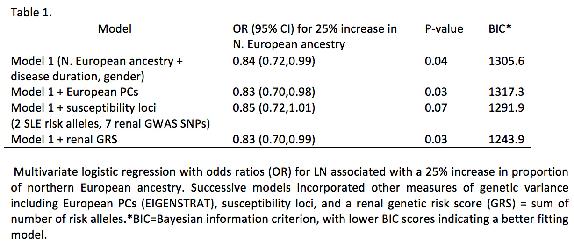Session Information
Session Type: Abstract Submissions (ACR)
Background/Purpose
Lupus nephritis (LN) has a higher prevalence among African Americans, Hispanics, and Asians compared to Caucasians. Significant differences in SLE severity also exist within continental groups, with northern European genetic ancestry conferring protection against autoantibody production and renal disease, which we have previously shown to be independent of socioeconomic status (SES). The goal of our study was to test whether the effect of northern European ancestry is mediated by known SLE risk alleles or recently identified LN susceptibility loci.
Methods
We studied 1142 SLE patients from four independent case collections with genotype data obtained from a previous
Results
The overall rate of LN in the study population was 27.3%. A 25% increase in the proportion of northern European ancestry was associated with a 16% reduction in the odds of having renal disease, after adjustment for disease duration and gender (OR 0.84, 95% CI
Conclusion
Northern European ancestry has a significant protective effect for renal disease among SLE patients of European ancestry; this appears to be independent of currently known SLE risk alleles and LN susceptibility loci, but may be partially explained by a PRS.
Disclosure:
S. French,
None;
K. E. Taylor,
None;
S. A. Chung,
None;
J. Nitiham,
None;
M. Petri,
None;
P. K. Gregersen,
None;
W. Ortmann,
Genentech Inc.,
3;
A. T. Lee,
None;
T. W. Behrens,
Genentech Inc.,
3;
S. Manzi,
None;
F. Y. Demirci,
None;
M. I. Kamboh,
None;
R. R. Graham,
Genentech Inc.,
3;
M. F. Seldin,
None;
L. A. Criswell,
None.
« Back to 2014 ACR/ARHP Annual Meeting
ACR Meeting Abstracts - https://acrabstracts.org/abstract/the-impact-of-northern-european-ancestry-and-susceptibility-loci-on-the-risk-of-lupus-nephritis/

